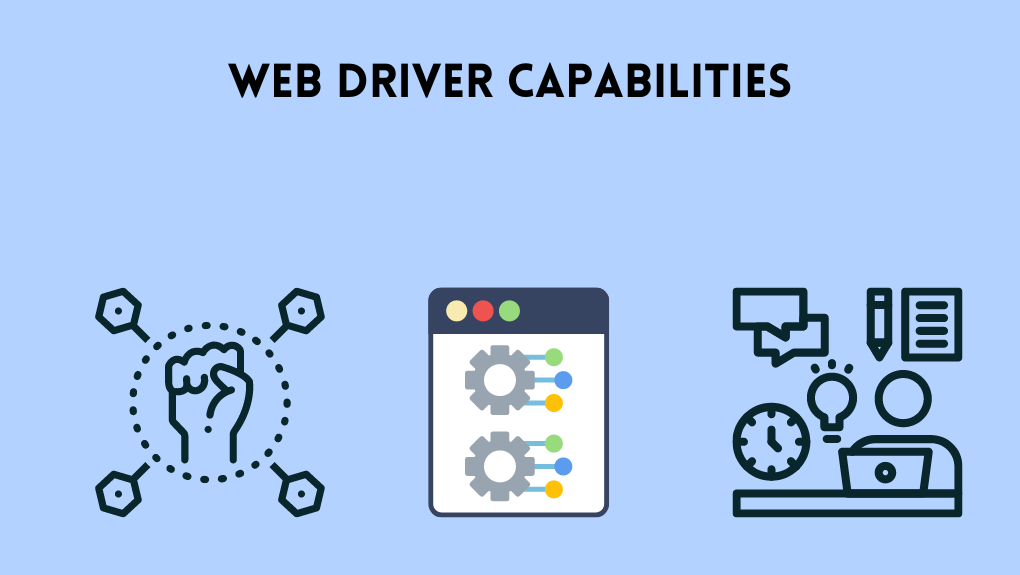Selenium WebDrive: Improving with Custom Webdriver Extensions
When it comes to online application testing, Selenium WebDriver is a shining example of dependability and efficiency. As the digital age keeps evolving, the seamless working of online applications that can function on one type of browser and several devices is rather significant.
As Selenium WebDriver is an automation tool, it allows developers and testers to automate their web application testing processes and speed them up by gaining internal and external accuracy assessments.
Selenium WebDriver is an advanced automation that allows accessible communication with website components. It mimics the behavior of actual users moving through a web application, accurately simulating user interactions from clicking buttons to filling out forms. This feature speeds up the testing procedure, web applications, and general dependability applications.
However, Selenium WebDriver catalyzes creativity and productivity in software development, serving as more than just a testing tool. It quickens development processes while lowering the possibility of regressions by automating tedious operations and enabling continuous integration and delivery pipelines.
On the other hand, browser apps are interoperable between browsers, so they can be used consistently in various situations, ultimately increasing customer satisfaction.
In our blog series, we'll go into the nitty-gritty of Selenium WebDriver, focusing on its abilities, practices, and features that can open the path to making the most of it. Join us on this adventure to discover Selenium WebDriver's potential and take your online testing projects to the next level, regardless of your experience level.
The Need for Custom WebDriver Extensions
In the rapidly shifting world of web development and testing, Selenium WebDriver's essential capability need to be improved. Developers can overcome this problem by using custom WebDriver extensions, which let them expand WebDriver's functionality to meet project-specific needs.
Benefits of Custom Extensions
Tailored WebDriver extensions are a priceless tool for every test automation engineer's toolbox, providing many advantages that can significantly increase testing projects' efficacy and efficiency. Here are a few main benefits:
1. Tailoring WebDriver Functionality
One of the main advantages of custom extensions is the ability to perfectly match WebDriver functionality to a project's particular needs and requirements. By expanding WebDriver's functionality, developers can easily incorporate unique features and optimizations catered to their application's specifics, expediting testing and boosting productivity.
2. Enhancing Test Automation Efficiency
Tailored extensions can optimize and mechanize monotonous duties, diminishing human exertion and quickening the testing process. By encapsulating complex tasks into reusable modules or plugins, engineers can increase the efficiency and consistency of their test suites and facilitate faster feedback loops and iteration cycles.
3. Improving Effectiveness
Custom extensions increase productivity and significantly boost the efficacy of test automation initiatives. By adding additional features and functionalities designed for certain testing situations, developers can find possible problems, confirm essential elements of application behavior, and reveal edge cases that standard WebDriver functionality might not fully address.
4. Access to Additional Features
By creating custom extensions, developers can enhance WebDriver with extra features and functionalities that are not available immediately. Custom extensions provide a flexible foundation for enhancing WebDriver's capabilities, adapting to evolving testing needs.
They permit engineers to modify and advance their testing approaches to maintain pace with the ever-changing terrain of contemporary software development. Using custom extensions, companies may optimize the return on their test automation efforts and produce software of superior quality with increased productivity and assurance.
Overview of Selenium WebDriver Features
Before diving into custom extensions, understanding Selenium WebDriver's features and constraints is crucial.
Built-in Capabilities
Several web automation features are pre-installed in Selenium WebDriver, such as;
a) Locating and utilizing web components
b) Controlling tabs and windows in a browser
c) Managing pop-ups and warnings
d) Restrictions and Limitations
However, Selenium WebDriver has drawbacks as well, such as these:
a) Unable to interface with SVG or Canvas, two types of web elements
b) Lack of integrated support for sophisticated operations such as mouse hovering and file uploads
What are Custom WebDriver Extensions?
Plugins and add-ons, or custom WebDriver extensions, expand WebDriver's capability beyond what it can do by default. Programming languages like Java, Python, or C# are commonly used to create these extensions, which easily interact with WebDriver to add new functionality or improve current ones.
Definition and Purpose
Custom WebDriver extensions are mostly used to handle particular testing requirements or issues that cannot be satisfied with the essential WebDriver capability alone. These add-ons might be anything from straightforward reporting or logging tools to intricate tool or service connections with other companies.
Types of Extensions
Custom WebDriver extensions can be classified into various types based on their functionality, including:
a) Logging and reporting extensions
b) Screenshot-capturing extensions
c) Element-highlighting extensions
d) Custom wait conditions
e) Browser manipulation extensions
Enhancing Selenium WebDriver Capabilities
One can enhance Selenium WebDriver capabilities in several ways with the help of custom WebDriver extensions.
1. Enhanced Performance
These extensions, which also integrate bespoke capabilities and optimize test scripts, result in faster test execution and enhanced overall performance. They increase testing efficiency through process simplification and the elimination of needless steps.
2. Tailored Features
Developers use custom WebDriver extensions to include features that align with testing requirements. These extensions meet various needs, including sophisticated logging methods, smooth screenshot capture, and seamless interfaces with multiple tools and frameworks.
3. Flexibility and Adaptability
WebDriver extensions give Selenium WebDriver the adaptability to meet the specific needs of any project. They allow teams to handle particular problems or specifications that normal WebDriver functions might not be able to meet adequately.
4. Maintenance and Scalability
Custom extensions improve test suite scalability and maintenance. They allow code to be modularized, facilitating better management and scalability as the project progresses. They also make it easier to reuse code components between different tests, which cuts down on repetition and boosts maintainability.
5. Integration with CI/CD Pipelines
WebDriver extensions automate testing and guarantee quick feedback cycles by integrating seamlessly with Continuous Integration/Continuous Deployment (CI/CD) pipelines. This integration supports agile development methodologies by creating a stable testing environment.
6. Cross-Browser Compatibility
WebDriver extensions can be customized to manage particular browser features and behaviors, guaranteeing consistent test execution across various browser versions and behaviors. This feature is essential for attaining thorough test coverage and ensuring the dependability of web applications in multiple settings.
Maintaining cross-browser compatibility is essential for providing a flawless user experience in today's fast-paced world of web content. Incorporating a cloud-based testing platform like LambdaTest into your arsenal of tools can completely change how you tackle this problem. It provides a solid issue of cross-browser compatibility.
LambdaTest is an AI-powered platform for test orchestration and execution, offering over 3000 real devices, browsers, and OS combinations. It enables running Selenium WebDriver tests across various browsers and OS combinations, dramatically reducing testing time and effort through parallelization.
LambdaTest ensures consistent behavior across various contexts, aiding in the early detection and resolution of compatibility issues. This minimizes the risk of encountering browser-specific problems, ensuring a dependable user experience.
Advanced Element Interactions
Custom extensions can be used to implement complex interactions with web elements that are not directly supported by the built-in capabilities of Selenium WebDriver.
They enrich test scenarios with realistic and comprehensive actions, including drag-and-drop, mouse hover, double-clicks, and context menu interactions.
1. Data-Driven Testing
To improve data-driven testing, combine proprietary WebDriver extensions with third-party data sources or environmental input data sets, allowing the same test logic to be executed while enhancing test coverage and robustness.
2. Dynamic Waits and Synchronization
WebDriver extensions can provide improved synchronization and waiting techniques, which will help testers better handle dynamic elements and asynchronous behavior. It guarantees that tests run consistently, even when page elements load or respond slowly.
3. Security Testing
Through the creation of custom extensions, workflows using Selenium WebDriver can be integrated with security testing functionality. These include vulnerability detection, securing communication protocols, and confirming that authentication and authorization techniques are implemented correctly.
4. Accessibility Testing
Workflows using Selenium WebDriver can be integrated with functionality for accessibility testing using custom extensions. It ensures that online applications are accessible to users with impairments by having capabilities like confirming keyboard navigation capability, assessing contrast ratios for readability, and testing for valid HTML semantics.
5. Performance Monitoring and Profiling
However, web development is constantly changing, so developers need more than the minimal features that Selenium WebDriver provides. This is where developers come into play, allowing them to modify and improve WebDriver's features to match their projects' unique requirements and difficulties.
Conclusion
To sum up, Selenium WebDriver is a critical component of online application testing, offering developers and testers a solid platform to guarantee the dependability and caliber of web applications.
The testing process is further improved by incorporating cloud-based testing systems such as LambdaTest, which allows for thorough cross-browser testing and early detection of compatibility problems.
Developers and testers can improve and innovate software testing by utilizing Selenium WebDriver and custom WebDriver extensions.










